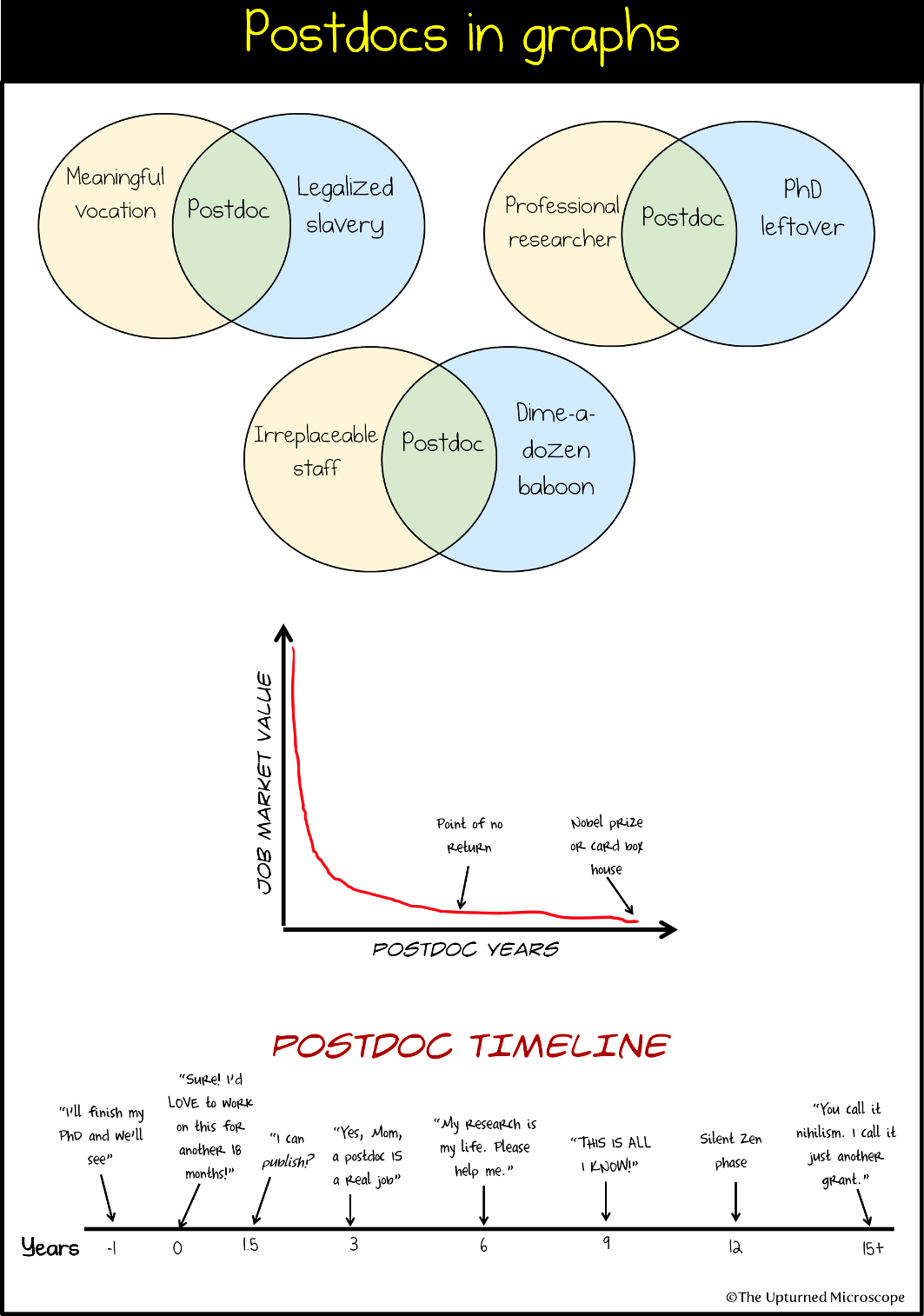Over the course of attending numerous iJOBS career panels and workshops on different job opportunities for PhD graduates, the one question invariably asked is: “Is a postdoc required for this position?”. Surprisingly, while there are several employers that have no problems answering this question, there are a few who seem to have a hard time committing to a simple “yes” or “no” answer. Which begs the question, what is a postdoc? What is a postdoc? The simplest definition of a postdoc (fellow, associate, etc.) is a person with a doctoral degree who is awarded a temporary position to gain additional training in preparation for a career in scientific research. IS A POSTDOC REQUIRED? Over the past few years, there have been growing concerns that the structure of graduate education and biomedical research is obsolete and that the postdoc position needs revamping. Although the comic below is an exaggeration, it highlights some of the problems of current postdoc position: (1) low wages, (2) low number of available tenure track positions, and (3) uncertain career trajectory.  Last January, Nature published results of a study on the impact of a postdoctoral position on factors in later career. The researchers focused on a sample of biomedical PhDs who received their degree between 1980 and 2010. The samples were classified according to whether they did postdocs or not, and what jobs they ended up in: (1) tenure track research, (2) non-tenure track research, (3) academia but not doing research, (4) research in industry, and (5) government/nonprofits. The study revealed several interesting results. First, majority of PhDs (80%) still opt to do some kind of postdoctoral training. Second, and somewhat expected, was that majority (72%) of postdocs continue on to do active research, mostly in an academic setting; however, a high percentage (45%) of non-postdocs also continue to do research, mostly in industry. This data suggests that outside of academia, the additional experience gained from doing a postdoc is not valued similarly to work experience. Moreover, postdocs on average earn less than non-postdocs; in fact, postdocs pay a penalty of 17-21% in income for up to 15 years after getting their PhDs. The study reported that the median annual starting salary of postdocs was $44,724 compared to $73,662 for those who entered non-academic workforces directly. Summary There is no question that postdoctoral training is an investment for the progress of biomedical research; however, it yields a negative return of investment on the postdocs themselves and their future career outcomes. The current state of the postdoc position begets the question: are PhDs better off financially if they skipped postdocs? Because a postdoc is still necessary for tenure-track faculty positions, could PhD graduates only do postdocs if they are certain they want to pursue an academic career? I know that people do research not for the money, but I don’t think postdocs should be penalized either. Hopefully, more studies like this will be conducted to better inform new policies for NIH and universities that would improve the postdoctoral system. Furthermore, movements like Rescuing Biomedical Research is taking action in understanding the current flaws in the structure of biomedical research as a whole, and what can be done to address it. What do you think about this study and its results? Do you have opinions on the current state of the postdoc position, and how it can be improved? I would love to hear your thoughts in the comments below. Full article can be found here: http://www.nature.com/nbt/journal/v35/n1/full/nbt.3766.html
Last January, Nature published results of a study on the impact of a postdoctoral position on factors in later career. The researchers focused on a sample of biomedical PhDs who received their degree between 1980 and 2010. The samples were classified according to whether they did postdocs or not, and what jobs they ended up in: (1) tenure track research, (2) non-tenure track research, (3) academia but not doing research, (4) research in industry, and (5) government/nonprofits. The study revealed several interesting results. First, majority of PhDs (80%) still opt to do some kind of postdoctoral training. Second, and somewhat expected, was that majority (72%) of postdocs continue on to do active research, mostly in an academic setting; however, a high percentage (45%) of non-postdocs also continue to do research, mostly in industry. This data suggests that outside of academia, the additional experience gained from doing a postdoc is not valued similarly to work experience. Moreover, postdocs on average earn less than non-postdocs; in fact, postdocs pay a penalty of 17-21% in income for up to 15 years after getting their PhDs. The study reported that the median annual starting salary of postdocs was $44,724 compared to $73,662 for those who entered non-academic workforces directly. Summary There is no question that postdoctoral training is an investment for the progress of biomedical research; however, it yields a negative return of investment on the postdocs themselves and their future career outcomes. The current state of the postdoc position begets the question: are PhDs better off financially if they skipped postdocs? Because a postdoc is still necessary for tenure-track faculty positions, could PhD graduates only do postdocs if they are certain they want to pursue an academic career? I know that people do research not for the money, but I don’t think postdocs should be penalized either. Hopefully, more studies like this will be conducted to better inform new policies for NIH and universities that would improve the postdoctoral system. Furthermore, movements like Rescuing Biomedical Research is taking action in understanding the current flaws in the structure of biomedical research as a whole, and what can be done to address it. What do you think about this study and its results? Do you have opinions on the current state of the postdoc position, and how it can be improved? I would love to hear your thoughts in the comments below. Full article can be found here: http://www.nature.com/nbt/journal/v35/n1/full/nbt.3766.html
iJOBS Blog